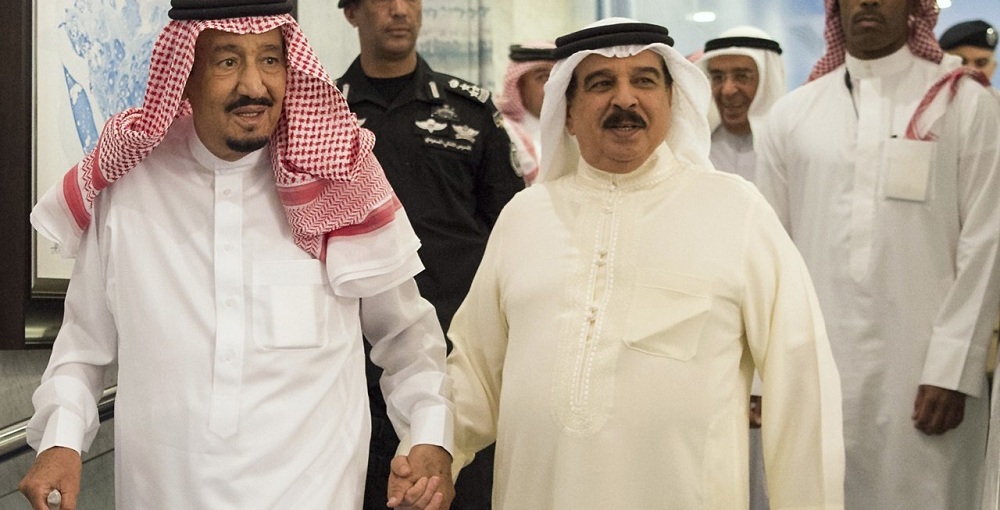Alwaght- The West-backed Al Khalifa family has been has been struggling with a legitimacy and inefficiency crisis in Bahrain that has been seen to widespread anti-regime protests since 2011. However, unwavering support from Saudi Arabia, the US and the UK has prevented the Sunni regime from collapse despite continued pro-democracy demonstrations by majority Shiite population of the Persian Gulf Island.
When popular uprising sparked in 2011, neighboring Saudi Arabia dispatched repressive military forces to Bahrain, dubbed the Peninsula Shield Force, with a green light from their Western allies. The forces deployment blocked the success of the pro-democracy revolution but Al Khalifa rulers are still precarious, and reliance on the foreign help to resist in the face of still-active crises inevitably exists.
Economic crisis
It has been years since Bahrain lost its privilege of being an investment attraction for the foreign companies and investors.
According to the United Nations data, the Foreign Direct Investment in Bahrain between 2005 and 2007, before the crisis struck the economy, was $1.6 billion on average annually. But this sum dropped to only $65 million in 2015.
The Bahraini regime in a report has announced that over the past three years, the foreign investment in the tiny island grew up once again, reaching $810 million in the first eight months of the current year. Even if the information is reliable, a clear investment gap remains in place compared to the pre-uprising years and the amount is incapable of covering the huge budget deficit of the regime.
The economists warn that the crisis is now serious to an extent that the central bank’s reserves only enough to run the country for just a month.
Adel Al-Marzough, the prominent Bahraini journalist, revealed in July that the country’s national debt now touches the $40 billion, adding that it is predicted to grow to $50 billion, with its annual interest at half a billion.
Additionally, the Bahrain Information and E-Government Authority on July 24 reported that the inflation in June this year was the highest in recent years. The Authority’s reports suggested that the housing, food, and transportation witnessed the biggest price rise, causing discontentment among the people with the government performance. The BIEGA’s report said that the housing sector rose 24 percent, tobacco 38 percent, food 16 percent, and transportation 10 percent. In June, the regional currency markets traded the Bahraini dinar 0.38261 against the US dollar, the lowest rate in 17 years.
The economists put down the Bahraini national currency value shrink to the currency sales by the financing funds and a surge of the government debts. This trouble hits the nation while the oil incomes, accounting for 75 percent of the gestate budget, considerably decreased over the past few years.
Bahrain is the smallest oil producer in the Persian Gulf region. The country is not oil-rich and produces 150,000 oil barrels a day, half of its daily supply, from a shared oilfield with Saudi Arabia.
Despite its oil income decrease, the small monarchy saw an increase in its state budget over the past years, something making the regime borrow further to contain its budget deficit. Last year, the national debt reached 89 percent of the gross domestic production (GDP). The International Monetary Fund (IMF) expects it to hit 100 percent by end of 2019.
Arab states’ support to Bahrain
In June, Saudi Arabia, the United Arab Emirates, and Kuwait said they will soon grant an aid package to Al Khalifa regime. The trio reportedly announced the aid value to be $10 billion. On Thursday, the bloc accepted to support the funding requirements of the Manama regime’s Fiscal Balance Program, which purportedly aims to secure the country’s long-term fiscal stability and eliminate its budget deficit by 2022.
This is not the first time that the (Persian) Gulf Cooperation Council states, holding nearly one-third of the world’s proven oil reserves, sign agreements of financial help to their fellow bloc members. In March 2011, the same countries gave a $20 billion aid package to Bahrain and Oman in a bid to create jobs, fund housing projects, and improve the two state’s infrastructure.
Experts argue that Manama needs a several-year multi-billion aid program to get the economy on the track. But the main challenge the regime needs to face is the fact that it needs to persuade the creditors that it can take austerity measures to raise its incomes and lower its spending for a budget deficit decrease.
Until now, Al Khalifa, fearing further discontentment, avoided taking tough measures. For years, the regime's policy of admitting Sunni migrants from some poor countries such as Pakistan and Sudan to demographically transform the population, the majority of which is Shiite Muslims. Austerity measures can destroy Bahrain’s attraction in the eyes of other countries’ nationals. Now, of the 1.4 million population of Bahrain, 750,000 are nationals.
Corruption, inefficiency, and repression
Over the past decades, corruption and the misdistribution of the resources in Bahrain by the ruling family fueled a large part of the popular dissent against the regime. The unhappiness with the rulers’ management of the state was surfaced by the anti-regime protests since 2011. Instead of being responsive, doing real reforms, and fighting the systematic corruption in the body of the regime to help improve the popular living levels, the leaders resorted to the crackdown and persecuting protestors.
According to the Human Rights Watch’s report, published in February, the rights violations by Al Khalifa regime’s forces included arrests, home storming, unfair trials, repressing the peaceful rallies, torturing the detainees, and a set of other restrictive measures. Manama regime is also condemned for mass revocation of Shiites’ citizenship.
For years, the Al Khalifa has managed to weather the economic challenges on the strength of closeness to Saudi Arabia. But now Riyadh itself is wrestling with economic troubles amid low oil prices, Yemen war heavy costs, and its money-taking 2030 Vision projects, making Al Khalifa rulers hardly able to give a slip to the financial problems using Saudi helping hand.



























